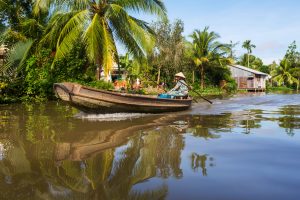Why was the prominent environmental activist Nguy Thi Khanh sentenced to two years in prison last month? First, one might conclude that it has nothing to do with Khanh’s environmentalism and instead was because the ruling Vietnamese Communist Party (VCP) has silenced most of its critics with ever-greater ferocity since 2016. After all, Dang Dinh Bach, a labor-rights activist, was sentenced to five years in prison in January on similar trumped-up tax charges, a new means of repressing certain voices. A Ministry of Foreign Affairs spokesperson said it was nothing to do with her activism.
The second interpretation says that it’s all to do with Khanh’s environmentalism and her imprisonment shows that the Vietnamese government really doesn’t care about climate action. Neither is that convincing. The Economist recently dubbed Vietnam “a bright spot on an otherwise soot-black map” for climate change action in Southeast Asia. (Indeed it is, although the bar is low.) Vietnam is now one of the top-ten producers of solar energy in the world. Prime Minister Pham Minh Chinh has committed to ending coal consumption by 2040 and has said his government will stop the construction of new coal-burning power stations. He wants to cut emissions to net-zero by 2050.
The third (and most plausible) explanation lies, naturally, somewhere in between. The two biggest existential crises facing the VCP are environmental change and environmental activism. I argued in 2017 that environmental activism is the biggest political threat to the Communist Party. (“Will the Environment Be the Vietnam Government’s Downfall?,” I asked.) In part that’s because environmentalists are somewhat insulated from criticism. Unlike the country’s pro-democracy movement, the Communist Party cannot simply claim they want to overthrow the political order; most are lobbying for reforms within the existing system. They are also deeply nationalistic, as seen with the lengthy protests after the Taiwanese-owned Formosa steel plant spilled tons of toxic waste in 2016. But as that protest showed, demands can quickly escalate beyond environmental issues. The slogan “Fish need clean water. Citizens need transparency” is still remembered from those demonstrations.
Environmentalism is also unifying. We’ve seen overtly pro-democracy groups like Bloc 8406 and the Brotherhood for Democracy come and go. In the countryside, land rights activism has become more explosive, as seen during the “Dong Tam massacre” in early 2020 that would have garnered more attention if COVID-19 hadn’t come along. In urban areas, independent unionism is on the rise. The middle classes and professionals are advocating for a genuine rule of law and private property rights. But these movements are disparate. Environmentalism provides an umbrella. It cuts across class – the poor farmer and the billionaire will be equally impacted by climate change – and across geography and generational lines. And it has created new bridges between individual activists, the wider public, and the burgeoning civil-society groups.
At the same time, environmental change is deeply troubling for the Party’s power. Because of the problems it causes, it increases the surface area of interactions between the VCP and the Vietnamese people. In any authoritarian state, you can live a rather peaceful life so long as politics doesn’t impact your life. That’s the tacit social contract; stay away from politics and politics will stay away from you. But public anger surges when there are more numerous points of friction between the system and the people. That’s the problem posed by environmental change. Because its impact is universal, affecting everyone in society, there are naturally going to be more points of dispute between what citizens and the Communist Party think is the right way forward. Because it won’t be solved in a few months or years, it’ll remain a perpetual issue for the Vietnamese people.
Naturally, the VCP is concerned. For sure, it rules over one of the most repressive states in Southeast Asia. But it does often have to listen to public complaints. A noteworthy example of this came when the Hanoi city authorities backed down to public protests over the city cutting down trees. Vietnam’s Western allies are used to turning a blind eye to its repression of factory workers or lawyers. But the United States and European Union have made much noise about Hanoi joining their climate agendas. Their response to Khanh’s imprisonment was more critical than usual.
The Communist Party is committed to tackling climate change but only on its own terms. It needs expert opinion (sometimes public pressure from activists) but won’t countenance all criticism, especially when it’s coming from the growing civil-society sector. It’s very much a top-down affair. It doesn’t want the Vietnamese people to be setting the parameters for action. After all, the people could demand tougher and quicker climate action than the Party wishes to pursue, affecting wider economic policy or the Party’s patronage system. After all, the Party knows that climate action isn’t about to disappear anytime soon. Give the people too much of a voice and they might begin to demand other changes.
One analogy is nationalism. Up until the 1990s, the Communist Party was the main arbitrator of patriotism. It was the party that defeated colonialism and then American and Chinese invasions. But since the 1990s, nationalism has fallen from the Party’s grasp. It now often has to follow the nationalist agenda rather than leading it; it is routinely accused of not being patriotic enough, especially in any issue involving China. In a similar fashion, the VCP doesn’t want to lose its mantle as the entity that is the arbitrator of climate action. It wants to be the driver, the embodiment, of environmental action in Vietnam. It wants people to rally around environmental action – but only under the communist banner.

































